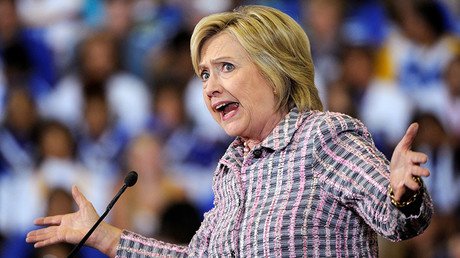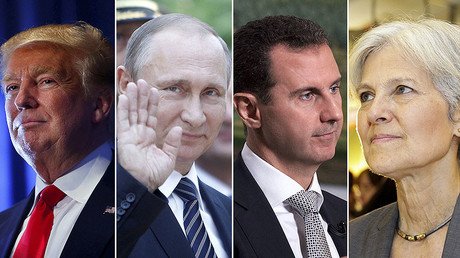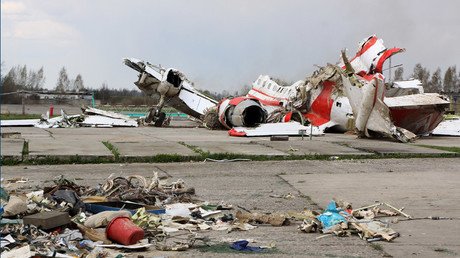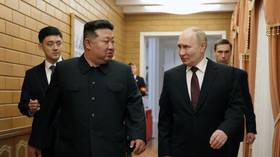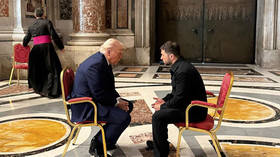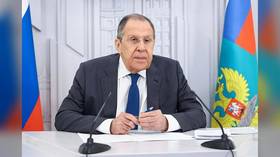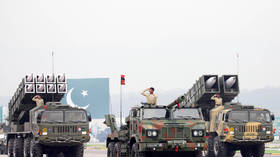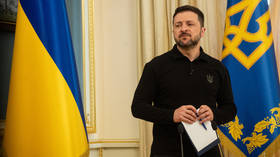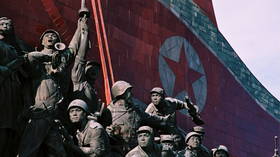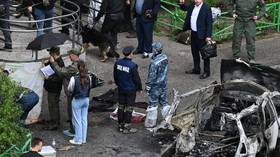MSM stoops to Stalin-era conspiracy theories
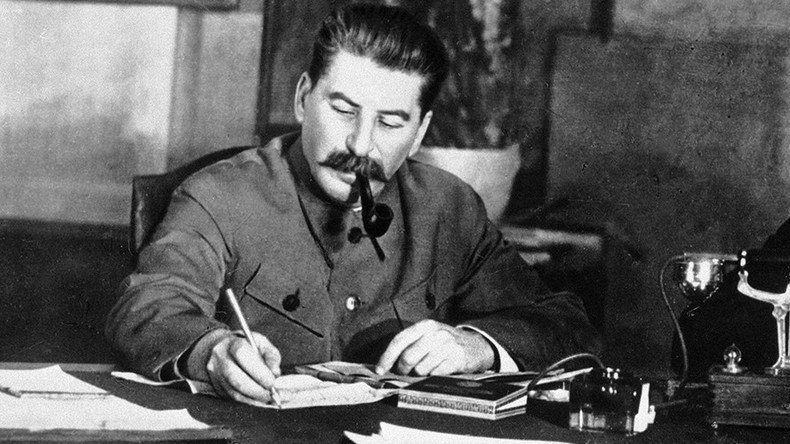
Propaganda, conspiracies, foreign agents and enemies everywhere – these would be typical issues present in Soviet newspapers during the rule of Joseph Stalin. But the western media applies the same techniques to stir up anti-Russia paranoia, today, in 2016.
A scoop from The Washington Post: Pro-US “liberal” thinkers in Moscow criticize the American media and even Obama’s administration! This is sensational news for anyone even remotely familiar with the subservient attitude of the Russian “liberals” to anything coming from the US or the EU.
In fact, even the US mainstream media itself seems to have picked up that its coverage of Russia is becoming obviously absurd.
“On Wednesday, for example, three of the six front-page stories in the New York Times were about Russia – its role in Syria, its latest high-profile hack and its secret influence campaigns in Europe,” The Washington Post reported in a mild critique of its colleagues’ work.
(As if The Washington Post had never itself printed issues containing 5-6 “critical” articles about Russia.)
In the same story, The Washington Post quoted several Russian “liberals,” who noticed that the campaign against Putin has been going off the rails for quite some time. “I find the political reaction [to claims that Russians “hacked” the US presidential campaign] from the United States very harmful to democracy all over the world,” The Washington Post quoted Moscow Carnegie Center’s expert Alexander Baunov as saying. “They do the same as Putin does, ascribing every problem possible to interference from abroad.”
The Poison Plot
The US mainstream media has gone far further than modern Russian media and even further than Brezhnev’s Soviet media in its paranoia about “foreign agents.” Russian politicians and the Russian media did accuse American agencies United States Agency for International Development (USAID) and International Republican Institute (IRI) of trying to discredit the Russian elections in 2011 and of helping the opposition.
Anyone familiar with western NGOs’ activities in Russia knows their sympathy to the radical opponents of the Russian government, so Russian accusations have not been groundless.
But not since Stalin’s time has the Russian media accused America or its agents of trying to poison Russian politicians. Meanwhile, The Washington Post did just that recently, publishing a story based on tweets written by a doctor named Bennet Omalu. In his tweets, the doctor, who had been made famous by becoming a prototype for one of Will Smith’s roles, suggested that Hillary Clinton “was being poisoned” by Putin and Trump.
I must advice the Clinton campaign to perform toxicologic analysis of Ms. Clinton's blood. It is possible she is being poisoned.
— Bennet Omalu (@bennetomalu9168) September 12, 2016
Acting in the style of WADA’s accusations against Russian athletes, the doctor did not produce any evidence to support his suspicions. Omalu just tweeted that he “did not trust Mr. Putin and Mr. Trump,” adding that with those two “all things are possible.”
Normally, thousands of alarmist tweets in the same vein are likely made every day. People don’t trust their doctors, suspect their neighbors, hate their bosses, etc. Now paranoid people tweet their suspicions out, and before Twitter and Facebook were invented, people wrote paranoid letters to newspapers.
But only the Soviet press took such “signals from the grassroots” seriously – as with the infamous ‘Doctors’ Plot’ in 1953 when a group of doctors – six Jewish and three Russian – stood accused of murdering Stalin’s right-hand man, Andrey Zhdanov, in 1948. The accusation was based on a letter from Kremlin therapist Lidya Timashuk, who said her Jewish colleagues had been giving Zhdanov the wrong treatment.
Omalu outdid Timashuk: he did not need a job at Clinton’s residence and he did not need access to her medical records to make his diagnosis from a distance. Several television images were enough for him and for The Washington Post to “diagnose” Clinton’s poisoning. Stalin’s Lidya Timashuk at least looked through Zhdanov’s analysis and took a job at the Kremlin before making her false claims (all doctors were acquitted right after Stalin’s death in March 1953).
Media imitates Obama
Why does the US media believe every conspiracy theory about Russia without requiring any evidence? It was noted more than 3,000 years ago by Chinese thinkers that subjects love to imitate their kings. When Obama recently denounced Trump to a cheering crowd for “going on Russian state television to talk down our military in order to curry favor with Vladimir Putin,” he must have been conscious that his statement would unleash a wave of copycat accusations against RT.
The Washington Post has already set alarm bells ringing: “Russia is using the playbook it has used in Europe to try to destabilize public trust in government, weaken support for the NATO military alliance… investing in Kremlin-controlled media such as RT and Sputnik, planting disinformation and other covert activities.”
'He loves this guy': Obama slams Trump’s appearance on RT, compares Putin to Saddam Hussein https://t.co/voMB6mxPw4
— RT (@RT_com) September 13, 2016
By the Soviet playbook
President Obama and The Washington Post do not even understand that by denouncing RT, they are in fact quoting the participants in the Soviet campaign against “bourgeois cosmopolitans” in the late 1940s and early 1950s.
At the time, some Soviet citizens were also denounced for talking to foreign media in exactly the same words, especially if these citizens’ answers involved “talking down our military.” Soon it was not just “our military,” but also our doctors, high schools, poetry, etc. All foreign criticisms of life in Stalin’s Soviet Union were described then in Pravda as “planting disinformation and other covert activities” – similar to today’s The Washington Post. Perhaps, the Soviet dissidents were right when they discovered such similarity between The Washington Post and the old Soviet media, that they started calling The Washington Post “Pravda on the Potomac” back in the 1980s?
Xenophobia in defense of “democracy”
Western mainstream media has accused RT of spreading conspiracy theories, but what about the western media’s own wild accusations against Russia and Russians? Some of them have a distinctly xenophobic character – which is also reminiscent of Soviet times, when any business deals with foreigners were viewed with suspicion. For Eugene Robinson of The Washington Post, a mere phrase made by Trump’s son in 2008, that Russians made up a large cross-section of Trump Organization’s assets, was enough to lead to accusations that Trump was in fact a Russian agent. Trump’s “consistent calls for having good relations with Russia” are also viewed as something deeply suspicious.
For historians, there is deeper problem behind all of these wild claims about Russia. When the Soviet bloc collapsed in 1989-1991, the West decided that Soviet negative experiences were a lesson only for Russia and to its former allies. Western countries and their new enthusiastic allies in eastern Europe were not supposed to learn anything from Soviet experience, except vigilance and firmness towards the Russians. Meanwhile, some of the most savage Soviet practices are being reborn not only in the West, but also in some of the new NATO members – in the ugliest possible form.
One such savage practice was the use of negative ethnic stereotypes. Russian Germans, who arrived in Russia back in the 18th century, were suspected by Stalin of being Nazi sympathizers during WWII simply because they had German roots.
But the ugly story pales in comparison to conspiracy theories about Russians spread in modern Poland.
Smolensk plane crash conspiracy
In Poland, the new radically nationalist government of the Law and Justice party is planning an exhumation of all the victims of the presidential plane crash in Smolensk in April 2010. Many relatives of the victims are against such a move, but the investigators, headed by Defense Minister Antoni Macierewicz are pressing ahead with their plans.
Why? Because they are directly accusing Russia and the former Polish liberal government of having plotted the plane crash in which Poland’s president Lech Kaczynski died. The conspiracy theories spread by Macierewicz included rumors that Russians somehow artificially created a fog around the airfield in Smolensk, so that the presidential plane would hit a birch tree near the spot where it was supposed to touch the ground. There were conspiracy theories about an explosion on board of the plane and about Russians allegedly using millions of tons of helium in order to make the plane unable to maintain its necessary altitude.
Ugly rumors told to relatives of victims
Gazeta Wyborcza, the most influential Polish daily, is publishing interviews with relatives of victims. In order to justify the exhumation, Polish prosecutors reportedly told the relatives terrible stories about Russians. Some of the relatives, according to the paper, were told that there were bullets found in the bodies, that Russians fired on the Poles who had survived the crash and tried to escape the plane in flames. The relatives were also told by prosecutors that bodies were mutilated and profaned by Russians.
Gazeta Wyborcza does not give credence to these claims, because they are directed not just against Russia but also against its political ally – former Prime Minister Donald Tusk who now heads the European Council. But the atmosphere, in which all kinds of bizarre anti-Russia conspiracy theories sprout was created by the joint efforts of the western mainstream media, with Gazeta Wyborcza’s active participation. The fruit of its labors will be bitter for everyone – not just for Russians.
The statements, views and opinions expressed in this column are solely those of the author and do not necessarily represent those of RT.

